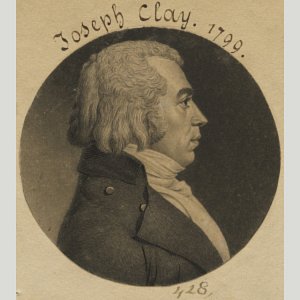Other Notable Figures: Revolutionary & Early Federal

George Washington
George Washington was a friend of the Berrien family, as well as a friend of the Moores of Philadelphia, the family of Major John Berrien's second wife, Williamina Moore. It was at Moore Hall in Chestertown, Pennsylvania where a subcommitte of the Continental Congress met to appoint George Washington as Commander in Chief of the Continental Army. As discussed above (see Judge John Berrien) the Berrien home, Rockingham, near Princeton was Washington's headquarters in1783. After the war, George Washington bestowed the honor of membership in the Society of the Cincinnati upon Major John and presented him with the society's eagle insignia. The Berrien Eagle is now the official Eagle of the Georgia Society of the Cincinnati. In 1792, George Washington and Thomas Jefferson appointed Berrien as Collector of Customs for the Port of Savannah.

John Hancock
| The signature on John Berrien's commission to join the Revolutionary War is John Hancock's. |

General Joseph Warren
The Berrien House is in Warren Ward just to the south of Warren Square in Savannah. The ward and square are named after General Warren, the Revolutionary War hero who lost his life at the Battle of Bunker Hill.
In Savannah on May 11, 1775 the Liberty Boys raided the British magazine and seized 600 pounds of gunpowder, which was used in the Battle of Bunker Hill on June 17,1775. The Liberty Boys, who met at Savannah'sTondee's Tavern to plan anti-British activities, were from the leading families of Savannah, including the Habersham, Jones, Sheftall, Telfair and Clay families.

General Lachlan McIntosh
John Berrien joined the Continental Army at the age of 16 as a 2nd lieutenant in the Georgia Continental Brigade, under General Lachlan McIntosh, for whom Berrien served as aide-de-camp. Berrien was a supporter of General McIntosh during the controversy following his slaying of Button Gwinnett in a duel. Berrien remained with McIntosh, and served under him in 1777 as Brigade Major of the North Carolina troops at Washington's headquarters at Valley Forge. After the Revolution, McIntosh purcahsed Eppinger's Tavern, one of the places where the Patriots had often met, and converted it to his residence. The building, much altered in the Victorian era, is on Oglethorpe Avenue in Savannah, a few blocks south of the Berrien House.
The Habersham Family
The Habershams were a notable family of early Georgia. Although James Habersham Sr. was a staunch loyalist, all three of his sons joined the Revolutionary cause. John and Joseph were both original members of the Society of the Cincinnati of Georgia, of which John Berrien was also an original member, secretary and later president.

Noble Wimberly Jones
The Joneses were another prominent family. Noble Jones came over with the first colonists in 1733 and among other accomplishments, served as head of the upper legislature of the colony. He was the first inductee of the Masons' Solomon's Lodge, in which Major John Berrien and his son were both prominent. Noble's son, Noble Wimberly Jones, was an ardent revolutionary, known as the "Morning Star of Liberty." He served as Speaker of the Revolutionary legislature and participated in the Continental Congress. Major John Berrien knew the younger Jones personally, as well as his son Judge George Jones, Mayor of Savannah 1812-1814.

The Clays
Joseph Clay (1741 – 1806), came to the Georgia Colony from Beverly, Yorkshire, in 1760 at the age of 16 to live with his uncle, James Habersham, Sr., and become involved in Habersham’s merchant business. Clay later began his own firm, and was Paymaster General for the Southern Department as a Colonel under General Nathaniel Greene during the Revolutionary War.
Joseph Clay, Jr. (1764-1811) was a distinguished attorney. John Macpherson Berrien read law with Joseph Clay, Jr. in preparation of joining the bar.
Joseph Clay, Jr. had attended Princeton and was a member of the Cliosophic debating society. He then read law under George Wythe in Williamsburg, Virginia, and returned to Savannah to practice law, where he was known for his eloquence. Clay was appointed a federal judge for the District of Georgia in 1796, and drafted the revision to Georgia’s state constitution. He was promoted to judge of the Fifth Circuit Court by President John Adams in 1801 as one of the “Midnight Judges” legislated out of office by Jefferson the next year. After being legislated out of office, Clay left the law altogether and became a Baptist minister. He accepted a call from the First Baptist Church of Boston and became a trustee of Brown University in 1807. He died in Boston just four years later.